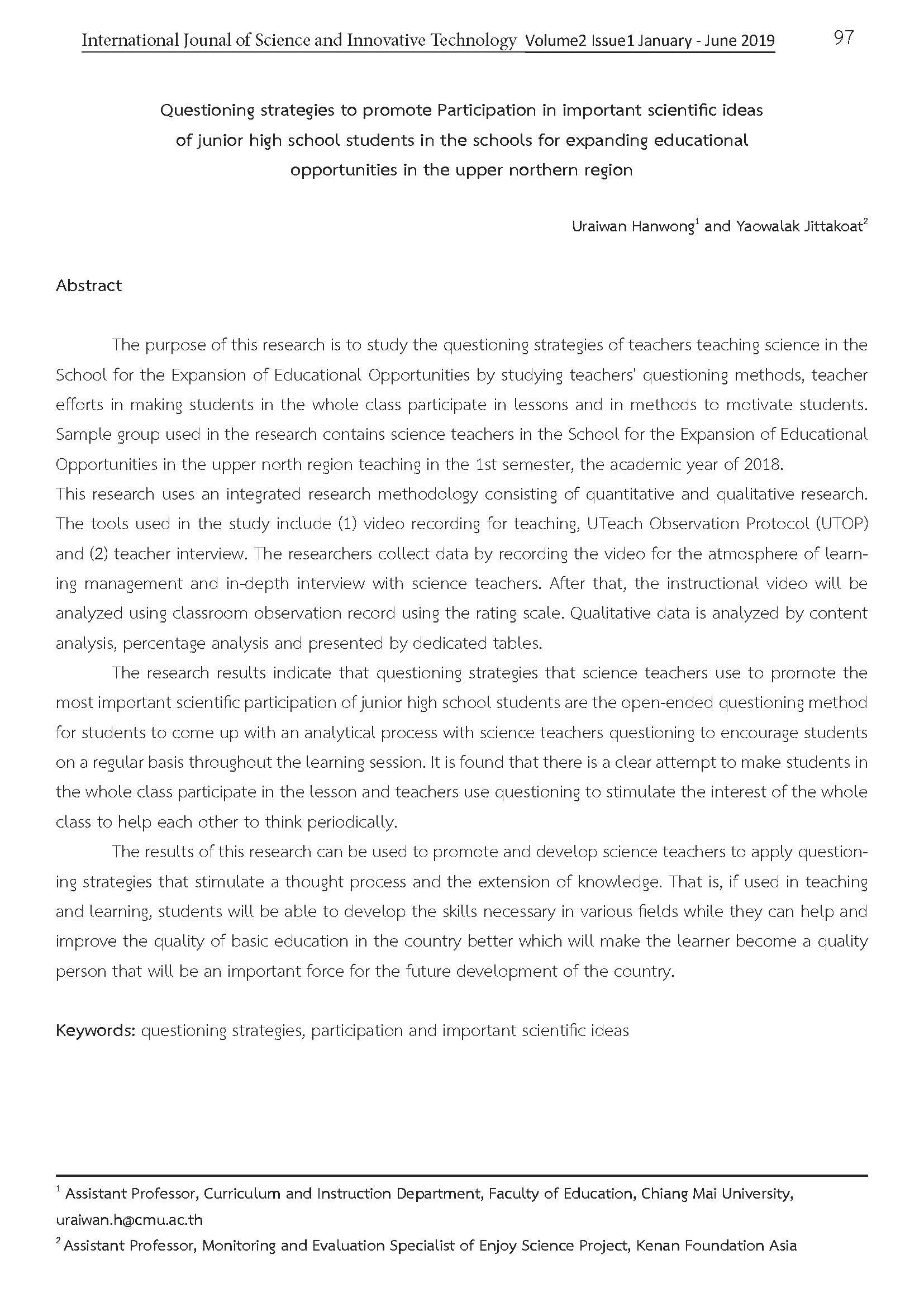Questioning strategies to promote Participation in important scientific ideas of junior high school students in the schools for expanding educational opportunities in the upper northern region
Main Article Content
Abstract
Abstract
The purpose of this research is to study the questioning strategies of teachers teaching science in the School for the Expansion of Educational Opportunities by studying teachers' questioning methods, teacher efforts in making students in the whole class participate in lessons and in methods to motivate students. Sample group used in the research contains science teachers in the School for the Expansion of Educational Opportunities in the upper north region teaching in the 1st semester, the academic year of 2018.
This research uses an integrated research methodology consisting of quantitative and qualitative research. The tools used in the study include (1) video recording for teaching, UTeach Observation Protocol (UTOP) and (2) teacher interview. The researchers collect data by recording the video for the atmosphere of learning management and in-depth interview with science teachers. After that, the instructional video will be analyzed using classroom observation record using the rating scale. Qualitative data is analyzed by content analysis, percentage analysis and presented by dedicated tables.
The research results indicate that questioning strategies that science teachers use to promote the most important scientific participation of junior high school students are the open-ended questioning method for students to come up with an analytical process with science teachers questioning to encourage students on a regular basis throughout the learning session. It is found that there is a clear attempt to make students in the whole class participate in the lesson and teachers use questioning to stimulate the interest of the whole class to help each other to think periodically.
The results of this research can be used to promote and develop science teachers to apply questioning strategies that stimulate a thought process and the extension of knowledge. That is, if used in teaching and learning, students will be able to develop the skills necessary in various fields while they can help and improve the quality of basic education in the country better which will make the learner become a quality person that will be an important force for the future development of the country.
Article Details
References
Jiraphon Akarasomphong. (2013). Questioning [Online system]. Source;https://sornorjira.wordpress.com/2013/04/24 (4 June 2019).
Chaiyong Promwong. (1984). New technology and Thai educational direction. Bangkok: Audiovisual department. Bureau of Central Library.
Pimphan Dekupt and Phayao Yindeesuk. (2005). General science methodology. Bangkok: Institute for Academic Quality Development (IAD)
Phop Laohapiboon. (1994) Science Teaching Guidelines. Bangkok: Thai Wattana Panich. Srinakharinwirot University.
Weerapong Longloi. Questioning skills. [Online system]. Source;https://www.gotoknow.org/posts/253798(4 June 2019)
Institute for the Promotion of Teaching Science and Technology (IPST.)(2004 b). Article on Summarizing for Study and Development for the learning and teaching models using Knowledg Inquiry method (Inquiry cycle or 5Es) to develop high-level thinking processes in the Biology field. Bangkok: Institute.
Somchit Sawanthanapibul. (Unknown publishing year). Science for elementary teachers. Bangkok: Srinakharinwirot University, Prasarnmit.
Suwit Mulkham and Orathai Mulkham. (2002). 21 Methods of learning management to develop thinking processes. (5th edition). Bangkok: Parbpim printing.
Arporn Jaithiang. (2003). Teaching principles. (2nd edition). Bangkok: Odean Store


